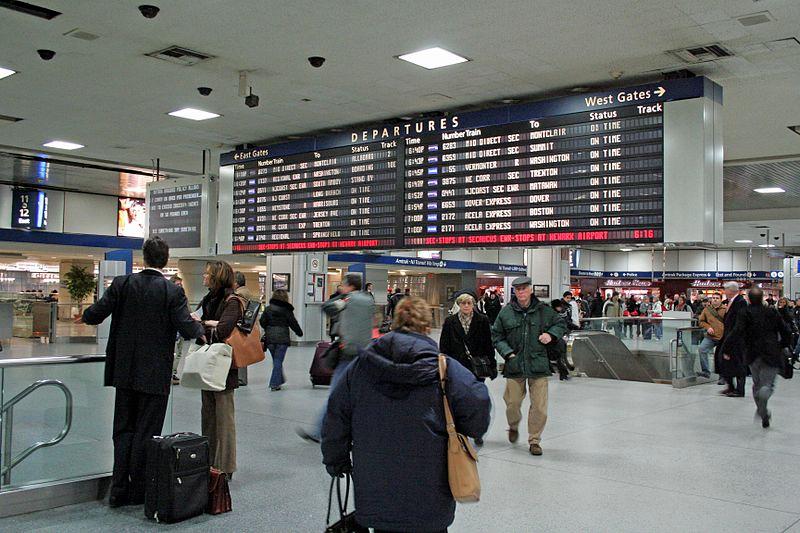Amtrak enjoying record ridership across system
Penn Station in New York City is the busiest station in the Amtrak system. (Photo by Alan Turkus via Wikimedia Commons.)
Amtrak has carried a record number of passengers for each of the last 11 months.
Some 30 million people let the train take them last year — and passengers are noticing.
“Ridership all summer has been nuts. We had days where there were people wandering the aisles looking for seats. There were people who were sitting on the floor because every seat was taken,” said one conductor who identified himself only as Jim. “We have the café car, you know, there’s no airport-type security to board, you’re free to walk around and you’re not confined to your seat.”
Being able to have access to portable electronics, and even WiFi on some routes, has also proven to be a big draw for the national passenger rail service.
Yet passenger trains depend on government subsidies, targeted by many Republicans in Congress for elimination, as well as GOP Presidential hopeful Mitt Romney.
But Amtrak’s Steven Kulm says the rail service has a good case to make.
“There’s a growing demand for travel by rail across the country. Not only are gas prices high and staying high, but there is some frustration with the aviation system and all of the hassles that go with flying,” he said. “Plus, Amtrak is actually improving services.”
He cited statistics that 75 percent of the line’s passengers now have access to WiFi onboard. Plus, he said, Amtrak is actually being asked by the states to add services.
“There is a demand out there in the states and by the public generally, to move to rail as an alternative to congested highways and to aviation,” he said.
Amtrak’s ridership has increased in eight of the last nine years, Kulm said. Ridership has increased 44 percent since 2000 — across the board.
“It’s in the Northeast corridor, it’s on our 15 state supported services, as well as our long distance trains,” he said.
Kulm also touted rail’s relative environmental efficiency, when compared to air travel or going by car.
“Certainly on the Northeast corridor where it’s electrified,” he said, “a lot of the power comes from hydro-based sources. Plus, we’re sort of reducing the nation’s dependence on foreign oil by using the electricity and the power grid just here at home.”
But Republicans say the Amtrak operating subsidy, some $466 million in the current fiscal year, is unsustainable. Kulm argues that subsidy is declining, from more than $700 million in 2004 to a request for just $450 million next year.
“I understand it takes about $450 million dollars for a single space shuttle mission,” he said. “And we’re providing train service in 46 states and we’re making a national connection for people that doesn’t exist anywhere else.”
Amtrak covers 85 percent of its own operating expenses, he added.
But Kulm says in the long-term Amtrak will still need capital support — but he says every form of transportation requires public support for infrastructure, from airports to highway pavement.
“We try to do our best to reduce that level of support, and we’ve succeeded in that, but in the end we’re still going to need some money to, particularly, keep our long-distance rails together, that really connect this nation in a way that no other transportation service does,” he said.
